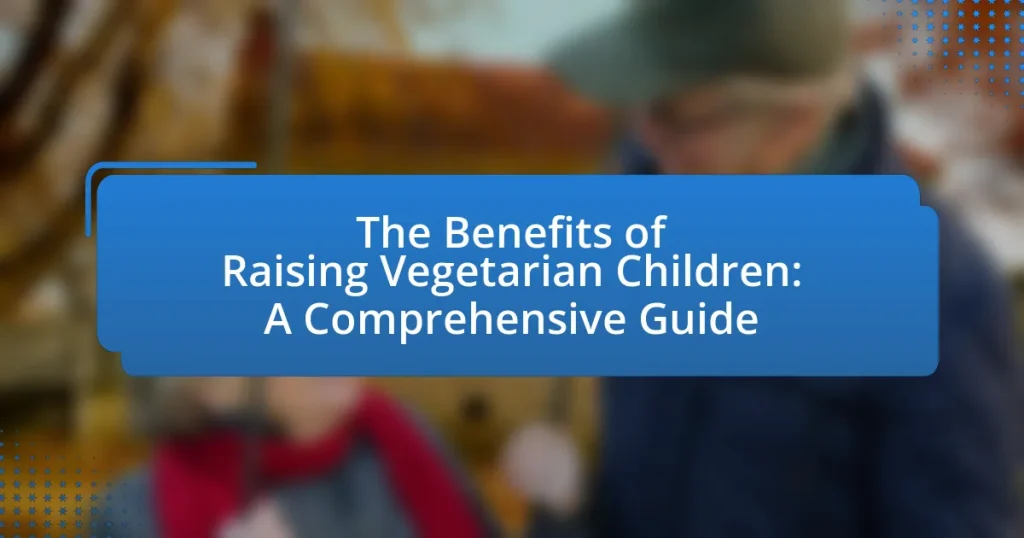The article “The Benefits of Raising Vegetarian Children: A Comprehensive Guide” explores the various advantages of adopting a vegetarian lifestyle for children, emphasizing health, environmental sustainability, and ethical awareness. It highlights how vegetarian diets can lead to improved health outcomes, including lower risks of obesity and chronic diseases, while also reducing carbon footprints and promoting compassion towards animals. The article provides practical advice for parents on ensuring balanced nutrition, addressing social challenges, and educating children about ethical eating. Additionally, it dispels common misconceptions about vegetarian diets and offers resources for families to support their dietary choices.

What are the Benefits of Raising Vegetarian Children?
Raising vegetarian children offers numerous benefits, including improved health, environmental sustainability, and ethical awareness. Studies indicate that vegetarian diets can lead to lower risks of obesity, heart disease, and certain cancers due to higher intakes of fruits, vegetables, and whole grains. Additionally, adopting a vegetarian lifestyle contributes to reduced carbon footprints and less resource depletion, as livestock farming is resource-intensive. Furthermore, raising children with a vegetarian diet fosters compassion and ethical considerations regarding animal welfare, promoting a sense of responsibility towards living beings.
How does a vegetarian diet impact children’s health?
A vegetarian diet can positively impact children’s health by providing essential nutrients while reducing the risk of chronic diseases. Research indicates that children on vegetarian diets often have lower body mass indexes (BMIs) and a reduced risk of obesity, type 2 diabetes, and heart disease. A study published in the Journal of the American Dietetic Association found that vegetarian children typically consume more fruits, vegetables, and whole grains, which are linked to better overall health outcomes. Additionally, vegetarian diets can support healthy growth and development when properly planned to include adequate protein, iron, calcium, and vitamins B12 and D.
What nutrients are essential for vegetarian children?
Vegetarian children require essential nutrients such as protein, iron, calcium, vitamin B12, vitamin D, omega-3 fatty acids, and zinc for healthy growth and development. Protein can be obtained from legumes, nuts, and dairy products, while iron is found in lentils, chickpeas, and fortified cereals. Calcium is crucial for bone health and can be sourced from dairy or fortified plant-based alternatives. Vitamin B12, primarily found in animal products, is vital for nerve function and can be supplemented or obtained from fortified foods. Vitamin D, important for calcium absorption, can be synthesized through sunlight exposure or taken as a supplement. Omega-3 fatty acids, essential for brain development, can be sourced from flaxseeds and walnuts. Zinc, necessary for immune function, can be found in beans, nuts, and whole grains. These nutrients are critical to ensure that vegetarian children meet their dietary needs for optimal health.
How can parents ensure balanced nutrition for vegetarian children?
Parents can ensure balanced nutrition for vegetarian children by providing a diverse diet that includes a variety of fruits, vegetables, whole grains, legumes, nuts, and seeds. This approach helps meet essential nutrient needs such as protein, iron, calcium, vitamin B12, and omega-3 fatty acids. For instance, legumes and nuts are excellent sources of protein, while fortified plant-based milk can provide calcium and vitamin D. Additionally, incorporating foods rich in vitamin C, like citrus fruits, can enhance iron absorption from plant sources. Research indicates that well-planned vegetarian diets can support healthy growth and development in children, as noted by the American Dietetic Association, which states that appropriately planned vegetarian diets are healthful and nutritionally adequate for all stages of life.
What are the environmental benefits of raising vegetarian children?
Raising vegetarian children significantly reduces environmental impact by lowering greenhouse gas emissions, conserving water, and preserving biodiversity. The livestock sector is responsible for approximately 14.5% of global greenhouse gas emissions, primarily methane and nitrous oxide, which are far more potent than carbon dioxide. By choosing a vegetarian diet, children contribute to a decrease in demand for meat production, which in turn lessens these emissions.
Additionally, meat production is water-intensive; it takes about 1,800 gallons of water to produce just one pound of beef. In contrast, plant-based foods generally require far less water, thus promoting water conservation. Furthermore, raising vegetarian children helps protect biodiversity, as livestock farming is a leading cause of deforestation and habitat destruction. By reducing meat consumption, families can help preserve ecosystems and the species that inhabit them.
How does a vegetarian diet contribute to sustainability?
A vegetarian diet contributes to sustainability by significantly reducing greenhouse gas emissions associated with food production. Research indicates that livestock farming is responsible for approximately 14.5% of global greenhouse gas emissions, primarily due to methane and nitrous oxide released during animal digestion and manure management. By choosing plant-based foods, individuals can lower their carbon footprint, as plant agriculture generally requires less energy, land, and water compared to animal agriculture. For instance, a study published in the journal “Nature” found that if everyone adopted a vegetarian diet, global food-related emissions could be reduced by up to 70% by 2050. This shift not only conserves natural resources but also promotes biodiversity by reducing the need for land conversion for grazing and feed crops.
What role do vegetarian children play in reducing carbon footprints?
Vegetarian children play a significant role in reducing carbon footprints by consuming plant-based diets that require fewer resources and generate lower greenhouse gas emissions compared to meat-based diets. Research indicates that livestock production is responsible for approximately 14.5% of global greenhouse gas emissions, primarily due to methane and nitrous oxide released during animal farming. By choosing vegetarian diets, children contribute to a decrease in demand for meat, thereby lessening the environmental impact associated with animal agriculture. Studies show that adopting a vegetarian lifestyle can reduce an individual’s carbon footprint by up to 50%, highlighting the substantial effect that dietary choices can have on climate change mitigation.
How does raising vegetarian children influence their ethical perspectives?
Raising vegetarian children significantly influences their ethical perspectives by fostering a strong sense of compassion and responsibility towards animals and the environment. Children raised on a vegetarian diet often develop a heightened awareness of animal welfare issues, as they learn to associate their food choices with the treatment of animals. Research indicates that vegetarian children are more likely to adopt pro-social behaviors, such as empathy and altruism, which are linked to their dietary practices. A study published in the journal “Appetite” found that children who follow vegetarian diets exhibit greater concern for animal rights and environmental sustainability compared to their meat-eating peers. This ethical framework not only shapes their personal values but also encourages them to advocate for social justice and environmental causes as they grow older.
What values are instilled in children through vegetarianism?
Vegetarianism instills values of compassion, health consciousness, and environmental awareness in children. By adopting a vegetarian diet, children learn to empathize with animals and understand the ethical implications of food choices, fostering a sense of compassion. Research indicates that children raised on vegetarian diets often exhibit a greater awareness of health and nutrition, as they are encouraged to consume a variety of fruits, vegetables, and whole grains, promoting lifelong healthy eating habits. Additionally, vegetarianism teaches children about sustainability and the environmental impact of food production, as studies show that plant-based diets generally have a lower carbon footprint compared to meat-based diets.
How can parents discuss ethical eating with their children?
Parents can discuss ethical eating with their children by engaging them in conversations about food sources, environmental impact, and animal welfare. This can be achieved through age-appropriate discussions that explain how food choices affect health, the planet, and animal rights. For instance, parents can share facts about factory farming and its consequences, such as pollution and animal suffering, to illustrate the importance of choosing ethically sourced foods. Additionally, involving children in meal planning and preparation can foster a deeper understanding of where food comes from and encourage them to make informed choices. Research indicates that children who are educated about ethical eating are more likely to adopt sustainable eating habits, as shown in studies highlighting the correlation between knowledge and dietary choices.

What Challenges Might Parents Face When Raising Vegetarian Children?
Parents may face several challenges when raising vegetarian children, including nutritional concerns, social pressures, and meal planning difficulties. Nutritional concerns arise as parents must ensure their children receive adequate protein, iron, calcium, and vitamin B12, which are commonly found in animal products. Research indicates that vegetarian diets can meet nutritional needs if well-planned, but parents often need to educate themselves on alternative sources of these nutrients. Social pressures can manifest during family gatherings, school lunches, or peer interactions, where children may feel excluded or face teasing for their dietary choices. Additionally, meal planning can become complex as parents strive to create balanced, appealing meals that satisfy both vegetarian and non-vegetarian family members, requiring extra time and effort in grocery shopping and cooking.
How can parents address social situations involving food?
Parents can address social situations involving food by proactively communicating their child’s dietary preferences and needs to hosts or organizers. This approach ensures that appropriate food options are available, reducing potential discomfort for the child. Research indicates that children who are raised with specific dietary practices, such as vegetarianism, may face social challenges, including feeling excluded during meals. By discussing these preferences in advance, parents can foster understanding and inclusivity, which is essential for the child’s social development.
What strategies can help children navigate meals at school or parties?
Children can navigate meals at school or parties by planning ahead, communicating dietary preferences, and being open to trying new vegetarian options. Planning ahead allows children to know what foods will be available and to bring their own snacks if necessary, ensuring they have suitable options. Communicating dietary preferences to teachers or hosts helps ensure that vegetarian choices are provided, fostering an inclusive environment. Additionally, encouraging children to be open to trying new vegetarian foods can enhance their meal experience and promote a positive attitude towards their dietary choices. These strategies support children in making healthy and enjoyable food choices in social settings.
How can parents encourage inclusivity while maintaining dietary choices?
Parents can encourage inclusivity while maintaining dietary choices by introducing diverse vegetarian options that cater to various dietary preferences and cultural backgrounds. This approach allows children to experience a wide range of flavors and textures, fostering an appreciation for different cuisines. For instance, incorporating dishes from various cultures, such as Indian lentil dal or Mediterranean falafel, can promote inclusivity. Research indicates that exposure to diverse foods can enhance children’s willingness to try new foods and develop a more open-minded attitude towards different dietary practices. By actively involving children in meal planning and preparation, parents can also encourage discussions about dietary choices, promoting understanding and respect for others’ preferences while adhering to their vegetarian lifestyle.
What misconceptions exist about vegetarian diets for children?
One misconception about vegetarian diets for children is that they do not provide sufficient protein. However, numerous plant-based sources such as legumes, nuts, seeds, and whole grains can meet protein needs effectively. The American Dietetic Association states that well-planned vegetarian diets are nutritionally adequate and can support healthy growth in children. Another misconception is that vegetarian diets lack essential nutrients like iron and calcium. In reality, foods such as fortified plant milks, leafy greens, and tofu can supply these nutrients adequately. Research published in the journal “Nutrients” confirms that with proper planning, vegetarian diets can fulfill all nutritional requirements for children.
How can parents educate others about vegetarianism?
Parents can educate others about vegetarianism by sharing information on its health benefits, environmental impact, and ethical considerations. They can organize workshops or discussions that highlight studies showing that vegetarian diets can reduce the risk of chronic diseases, such as heart disease and diabetes, as supported by research from the American Dietetic Association. Additionally, parents can provide resources, such as books and articles, that detail the positive effects of vegetarianism on the planet, including reduced carbon footprints and less resource consumption, as noted in reports by the Food and Agriculture Organization. Engaging in community events, cooking demonstrations, and social media campaigns can further amplify their message and encourage others to consider vegetarian lifestyles.
What are common myths about protein intake in vegetarian diets?
Common myths about protein intake in vegetarian diets include the belief that vegetarians cannot meet their protein needs and that plant-based proteins are inferior to animal-based proteins. Research indicates that a well-planned vegetarian diet can provide adequate protein through sources such as legumes, nuts, seeds, and whole grains. For instance, the Academy of Nutrition and Dietetics states that with proper planning, vegetarians can achieve sufficient protein intake and maintain health. Additionally, many plant proteins contain all essential amino acids when combined appropriately, debunking the myth of their inferiority.

What Practical Tips Can Help Parents Raise Vegetarian Children Successfully?
To successfully raise vegetarian children, parents should ensure a balanced diet that includes a variety of fruits, vegetables, whole grains, legumes, nuts, and seeds. This diversity helps meet nutritional needs, as vegetarian diets can lack certain nutrients like protein, iron, and vitamin B12. Research indicates that children on well-planned vegetarian diets can achieve adequate growth and development, as supported by the American Dietetic Association, which states that appropriately planned vegetarian diets are healthful and nutritionally adequate for all stages of life. Parents should also involve children in meal planning and preparation to foster interest in vegetarian foods and educate them about nutrition, which can promote lifelong healthy eating habits.
How can parents introduce vegetarian meals to their children?
Parents can introduce vegetarian meals to their children by gradually incorporating plant-based foods into their diets. Starting with familiar dishes, such as pasta or tacos, and substituting meat with vegetables, legumes, or plant-based proteins can ease the transition. Research indicates that children are more likely to accept new foods when they are presented alongside their favorite meals, making this approach effective. Additionally, involving children in meal preparation can increase their interest in vegetarian options, as studies show that participation in cooking enhances willingness to try new foods.
What are some easy vegetarian recipes for kids?
Easy vegetarian recipes for kids include vegetable quesadillas, which combine cheese and assorted vegetables in a tortilla, and can be cooked quickly on a skillet. Another option is pasta primavera, where pasta is tossed with a variety of colorful, sautéed vegetables and a light sauce. Additionally, homemade vegetable pizza allows children to choose their favorite toppings, making it interactive and fun. These recipes are not only simple to prepare but also encourage kids to enjoy a variety of vegetables, promoting healthy eating habits.
How can parents involve children in meal preparation?
Parents can involve children in meal preparation by assigning age-appropriate tasks such as washing vegetables, measuring ingredients, or stirring mixtures. Engaging children in these activities not only teaches them essential cooking skills but also fosters a sense of responsibility and teamwork. Research indicates that children who participate in meal preparation are more likely to try new foods and develop healthier eating habits, as noted in a study published in the Journal of Nutrition Education and Behavior, which found that children involved in cooking were more open to consuming fruits and vegetables.
What resources are available for parents raising vegetarian children?
Parents raising vegetarian children can access a variety of resources, including cookbooks, online forums, and nutrition guides. Cookbooks such as “The Vegetarian Family Cookbook” by Nava Atlas provide recipes tailored for families, ensuring balanced nutrition. Online forums like the Vegetarian Resource Group offer community support and expert advice on vegetarian diets for children. Additionally, websites such as Kids Eat Right, created by the Academy of Nutrition and Dietetics, provide evidence-based information on ensuring children receive adequate nutrients while following a vegetarian diet. These resources collectively support parents in making informed dietary choices for their vegetarian children.
Where can parents find nutritional information and support?
Parents can find nutritional information and support through reputable organizations such as the Academy of Nutrition and Dietetics, which offers resources specifically for vegetarian diets. Additionally, the USDA provides dietary guidelines and resources that include vegetarian options. These organizations are recognized for their evidence-based information, ensuring that parents receive accurate and reliable guidance on nutrition for their children.
What books or websites are recommended for vegetarian families?
Recommended books for vegetarian families include “The Vegetarian Family Cookbook” by Jay Solomon, which offers a variety of family-friendly recipes, and “Plant-Powered Families” by Dreena Burton, focusing on nutritious meals for children. Websites such as “Oh She Glows” provide a wealth of plant-based recipes and resources tailored for families, while “Forks Over Knives” offers meal plans and educational content on the benefits of a vegetarian diet. These resources are well-regarded for their practical advice and diverse recipe options, making them suitable for families transitioning to or maintaining a vegetarian lifestyle.


